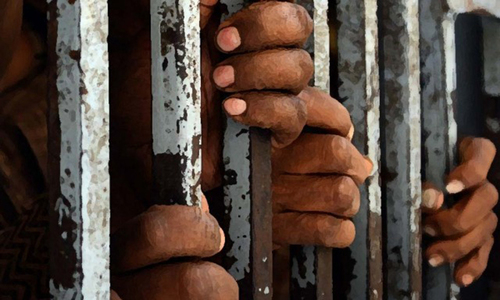ISLAMABAD: The Supreme Court declared on Wednesday that presenting falsehoods before trial courts in criminal cases will now be treated as perjury, entailing serious penal consequences.
“Our judicial system has suffered a lot as a consequence of deviation from the truth and it is about time that such a colossal wrong may be rectified in all earnestness,” Chief Justice Asif Saeed Khosa observed in a verdict he wrote. The rule of falsus in uno, falsus in omnibus — the Latin phrase saying ‘false in one thing, false in everything,’ — will now be an integral part of our jurisprudence in criminal cases, the chief justice decreed while heading a three-judge SC bench also consisting of Justice Mazhar Alam Khan Miankhel and Justice Sajjad Ali Shah.
The bench had taken up the case relating police constable Khizar Hayat who made a false statement before a trial court in 2007, as a result of which Mohammad Ilyas — who had come in appeal before the apex court — had been given the death sentence by the trial court. “Truth is the foundation of justice and justice is the core and bedrock of a civilised society; any compromise on truth amounts to a compromise on a society’s future as a just, fair and civilised society,” the chief justice observed.
Judgement notes that judicial system has suffered greatly from the practice
The judgement regrets that the superior courts in Pakistan have so far always held this rule inapplicable to criminal cases. Thus, falsehood was gradually encouraged and emboldened, making it more and more difficult for courts to discover truth and dispense justice. After careful consideration of the history of the rule, the relevant Islamic provisions, the law of the land, and after analysing precedent case law available on the subject, the chief justice observed, “We have come to the conclusions that the view that this rule was not applied to criminal cases in Pakistan was formed as a result of taking into account extraneous and practical considerations rather than legal and jurisprudential.”
Tracing its history, the chief justice recalled that this rule was held not to apply to cases in Pakistan from the 1951 case of Ghulam Mohammad through a judgement authored by the then chief justice Mohammad Munir. It noted that Justice Munir had been of the view that the job of a judge was to discover the truth, whereas in Pakistan’s system of criminal justice, discovering the truth is the job of the investigating agency and the judge is to decide as to whether the allegations being levelled against an accused person have been proved by the prosecution in accordance with the law or not. Such blurring of the distinction between the jobs of an investigator and a judge (in the reasoning of justice Munir, said the judgement handed down by Chief Justice Asif Saeed Khosa) had remained unnoticed in all subsequent cases, which went a long way towards distorting criminal jurisprudence, in addition to demeaning the virtue of truth.
“The aim while deciding criminal cases ought not to be to get at the truth, but to decide a matter in light of the settled legal principles with the sole focus on determining whether the evidence on the record proves the guilt of the accused person in accordance with the requisite standard, ie beyond reasonable doubt, or not,” it explained.
In conclusion, the judgement decreed that any witness found by a court to have resorted to a deliberate falsehood on a material aspect will, without any latitude, invariably be proceeded against for perjury.
Published in Dawn, March 21st, 2019














































